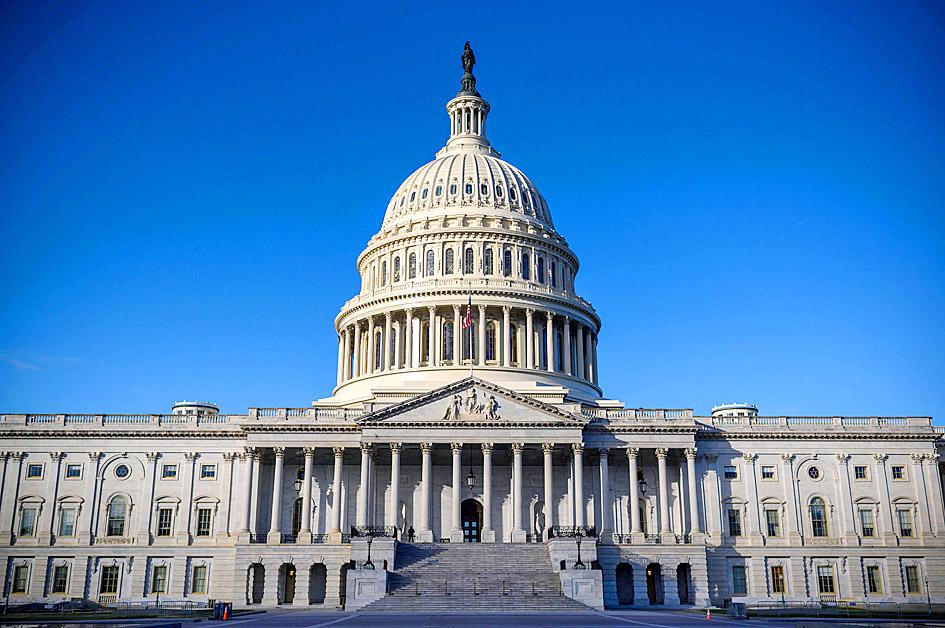The US Congress on Friday overrode US President Donald Trump’s veto of a defense policy bill, a first by lawmakers since he took office nearly four years ago, ensuring that the measure becomes law, despite Trump’s rejection.
In an extraordinary New Year’s Day session, the Republican Party-controlled US Senate easily turned aside the veto, dismissing Trump’s objections to the US$740 billion bill and handing him a stinging rebuke just weeks before he leaves the White House.
Trump lashed out on Twitter, saying that the Senate missed an opportunity to eliminate protections for social media platforms that he said give “unlimited power to Big Tech companies. Pathetic!!!”

Photo: AFP
Trump also slammed lawmakers for rejecting his call to increase COVID-19 relief payments to US$2,000: “They want to give people ravaged by the China Virus $600, rather than the $2000 which they so desperately need. Not fair, or smart!”
The 81-13 vote in the Senate on the widely popular defense bill followed an earlier 322-87 override vote in the US House of Representatives.
The bill affirms a 3 percent pay raise for US troops and guides defense policy, cementing decisions about troop levels, new weapons systems and military readiness, personnel policy and other military goals.
US House of Representatives Speaker Nancy Pelosi, a Democrat, said the “sweeping and overwhelmingly bipartisan votes” in the House and Senate “delivered a resounding rebuke to President Trump’s reckless assault on America’s military and national security.”
Trump’s veto of the National Defense Authorization Act (NDAA) “would have hurt the health, financial security and safety of our service members, their families, our veterans and our allies and partners worldwide,” Pelosi said.
“Instead of keeping Americans safe, the president continues to use his final moments in office to sow chaos and undermine our security,” she added.
The defense bill, which now has the force of law, “looks after our brave men and women who volunteer to wear the uniform,” US Senate Majority Leader Mitch McConnell said.
“But it’s also a tremendous opportunity: to direct our national security priorities to reflect the resolve of the American people and the evolving threats to their safety, at home and abroad. It’s our chance to ensure we keep pace with competitors like Russia and China,” he added.
The Senate override was delayed after US Senator Bernie Sanders objected to moving ahead until McConnell allowed a vote on the Trump-backed plan to boost COVID-19 relief payments to US$2,000.
McConnell did not allow that vote; instead he used his parliamentary power to set a vote limiting debate on the defense measure, overcoming a filibuster threat by Sanders and US Senate Minority Leader Chuck Schumer.
Without a bipartisan agreement, a vote on the bill could have been delayed until last night.
However, lawmakers agreed to an immediate roll call on Friday once the filibuster threat was stopped.
Trump vetoed the defense measure last week, saying it failed to limit Twitter and other social media companies he claimed were biased against him during his failed re-election campaign.
Trump also opposed language that allows for the renaming of military bases that honor Confederate leaders.
US Senator Jim Inhofe, chairman of the Senate Armed Services Committee and a close Trump ally, hailed the override vote.

DEMOGRAPHICS: Robotics is the most promising answer to looming labor woes, the long-term care system and national contingency response, an official said Taiwan is to launch a five-year plan to boost the robotics industry in a bid to address labor shortages stemming from a declining and aging population, the Executive Yuan said yesterday. The government approved the initiative, dubbed the Smart Robotics Industry Promotion Plan, via executive order, senior officials told a post-Cabinet meeting news conference in Taipei. Taiwan’s population decline would strain the economy and the nation’s ability to care for vulnerable and elderly people, said Peter Hong (洪樂文), who heads the National Science and Technology Council’s (NSTC) Department of Engineering and Technologies. Projections show that the proportion of Taiwanese 65 or older would

Nvidia Corp yesterday unveiled its new high-speed interconnect technology, NVLink Fusion, with Taiwanese application-specific IC (ASIC) designers Alchip Technologies Ltd (世芯) and MediaTek Inc (聯發科) among the first to adopt the technology to help build semi-custom artificial intelligence (AI) infrastructure for hyperscalers. Nvidia has opened its technology to outside users, as hyperscalers and cloud service providers are building their own cost-effective AI chips, or accelerators, used in AI servers by leveraging ASIC firms’ designing capabilities to reduce their dependence on Nvidia. Previously, NVLink technology was only available for Nvidia’s own AI platform. “NVLink Fusion opens Nvidia’s AI platform and rich ecosystem for

Taiwan Semiconductor Manufacturing Co (TSMC, 台積電) yesterday said it is building nine new advanced wafer manufacturing and packaging factories this year, accelerating its expansion amid strong demand for high-performance computing (HPC) and artificial intelligence (AI) applications. The chipmaker built on average five factories per year from 2021 to last year and three from 2017 to 2020, TSMC vice president of advanced technology and mask engineering T.S. Chang (張宗生) said at the company’s annual technology symposium in Hsinchu City. “We are quickening our pace even faster in 2025. We plan to build nine new factories, including eight wafer fabrication plants and one advanced

‘WORLD’S LOSS’: Taiwan’s exclusion robs the world of the benefits it could get from one of the foremost practitioners of disease prevention and public health, Minister Chiu said Taiwan should be allowed to join the World Health Assembly (WHA) as an irreplaceable contributor to global health and disease prevention efforts, Minister of Foreign Affairs Lin Chia-lung (林佳龍) said yesterday. He made the comment at a news conference in Taipei, hours before a Taiwanese delegation was to depart for Geneva, Switzerland, seeking to meet with foreign representatives for a bilateral meeting on the sidelines of the WHA, the WHO’s annual decisionmaking meeting, which would be held from Monday next week to May 27. As of yesterday, Taiwan had yet to receive an invitation. Taiwan has much to offer to the international community’s